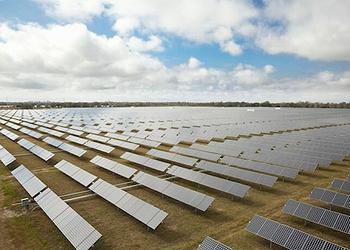
NEW YORK, New York, July 21, 2014 (ENS) – To increase their access to cost-competitive renewable energy, 12 large corporations have signed the Renewable Energy Buyers’ Principles to better communicate their purchasing needs and expectations to the marketplace.
The initial buyers’ group signatories have not formed a closed group. More companies can join as they recognize the need for market change to take advantage of renewable energy opportunities.
The 12 initial companies: Bloomberg, Facebook, General Motors, Hewlett-Packard, Intel, Johnson & Johnson, Mars, Novelis, Procter and Gamble, REI, Sprint, and Walmart, are hoping the principles will open up new opportunities for collaboration with utilities and energy suppliers to increase their ability to buy renewable energy.

With a combined renewable energy target of 8.4 million megawatt hours a year through 2020, these participating companies are seeking a market shift to achieve their sustainable energy goals.
The buyers’ group is not a power purchase group, but an informal consortium of companies interested in sharing best practices and overcoming the obstacles to buying renewable energy.
Large-scale buyers often have to work around traditional utilities to purchase renewables at competitive prices at the scale they need, increasing complexity and transaction costs.
The nonprofit groups World Wildlife Fund, WWF, and the World Resources Institute recognized their need for clearer guidelines and convened leading companies to create the Buyers’ Principles.
“These companies are leading the market in creating demand for renewable energy. The Buyers’ Principles provide sound guidance to the market providers,” said Suzanne Apple, senior vice president for private sector engagement for WWF. “Some of America’s largest companies are embracing renewable energy, and their collective demand requires the market to keep pace.”
The Renewable Energy Buyers’ Principles evolved from a collaboration between WWF and the Colorado-based Rocky Mountain Institute to identify barriers to corporate achievement of renewable energy targets.
The groups convened a Corporate Renewable Energy Buyers’ Day in 2013 to prioritize possible solutions. As a result, the Rocky Mountain Institute created the Renewables Resource Center and WWF partnered with the World Resources Institute to develop the new Buyers’ Principles.
The Renewable Energy Buyers’ Principles define six criteria that would help companies meet their renewable energy purchasing goals:
Greater choice in procurement options
More access to cost competitive options
Longer-term and variable-term contracts
Access to new projects that reduce emissions beyond business as usual
Streamlined third-party financing
Increased purchasing options with utilities
David Ozment, senior director of energy for Walmart, said, “These Buyers’ Principles lay the groundwork for partnerships to help energy buyers like us go further faster.”

“We know our company’s goal to be supplied by 100 percent renewable energy is good for business and good for the environment,” said Ozment. “If we can buy renewable energy for less, we can operate for less, and we can pass on the savings and a cleaner energy future to our customers and their communities. We hope others across the energy ecosystem will join us in making these principles a reality.”
“Supplying renewable energy efficiently enables the scale of deployment necessary to achieve carbon neutral operations,” said Kevin Rabinovitch, global sustainability director for Mars Incorporated. “The Renewable Energy Buyers’ Principles are a powerful way to bring energy suppliers and consumers together, enabling us to work creatively to maximize the inherent benefits that come from clean energy generation with more predictable costs.”
While renewable energy made up more than half of all new installed U.S. electrical generating capacity during the first half of 2014, large buyers say they find current renewable energy markets are complicated to navigate and do not deliver the products corporate customers need.
According to the latest “Energy Infrastructure Update” report from the Federal Energy Regulatory Commission’s Office of Energy Projects, solar, wind, biomass, geothermal, and hydropower provided 55.7 percent of new installed U.S. electrical generating capacity during the first six months of this year – 1,965 megawatts of the 3,529 MW total installed.
Solar power alone accounted for nearly a third of new U.S. generating capacity to date in 2014: 32.1 percent, wind provided 19.8 percent, followed by biomass 2.5 percent, geothermal 0.9 percent, and hydropower 0.5 percent.
Most of the balance, 44.1 percent, of the new generating capacity was provided by natural gas while no new coal or nuclear power capacity was reported.
The Buyers’ Principles address the obstacles large companies face in procuring and installing the growing amount of renewable energy available.
The volume of renewable energy needed to meet the corporate goals of these 12 companies demonstrates a clear demand and a market opportunity for providers.
“We know cost-competitive renewable energy exists but the problem is that it is way too difficult for most companies to buy,” said Amy Hargroves, director of corporate responsibility and sustainability for Sprint.
“Very few companies have the knowledge and resources to purchase renewable energy given today’s very limited and complex options,” said Hargroves. “Our hope is that by identifying the commonalities among large buyers, the principles will catalyze market changes that will help make renewables more affordable and accessible for all companies.”
Copyright Environment News Service (ENS) 2014. All rights reserved.
© 2014, Environment News Service. All rights reserved. Content may be quoted only with proper attribution and a direct link to the original article. Full reproduction is prohibited.
